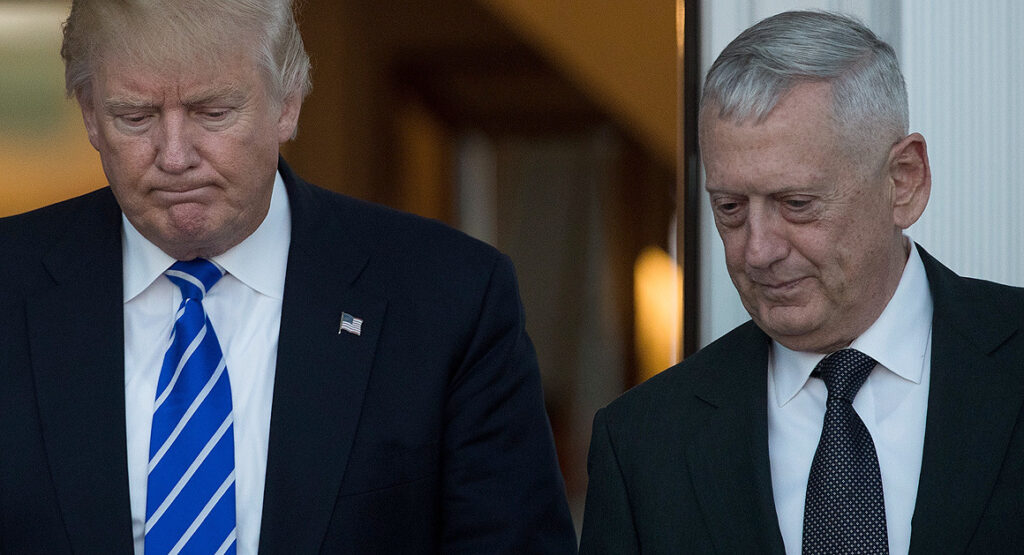
President Trump and Defense Secretary Jim Mattis
President Donald Trump’s six latest nominees to lead the Pentagon provide some hope for those who have long been frustrated with the Defense Department’s roadblocks to procuring innovative technologies.
From the Boeing executive who spent time on the company’s successful commercial side who’s been picked for Deputy Defense Secretary, to the House Armed Services aide who crafted the committee’s blueprint for defense procurement reform named to lead the Cost Assessment and Program Evaluation unit, these selections point to a preference for people who might the rock the traditional defense procurement system.

Elana Broitman, former DASD for manufacturing& industrial base policy
This would be welcome news to innovators — from Silicon Valley, the Brooklyn Navy Yard or Wichita, Kan. — who often develop new equipment at lower cost, or none, to the taxpayer. But they have had a hard time finding defense customers because the Pentagon didn’t fund or conceive of their development.
This new leadership comes to the department on the heels of an important recent legal case that may have the power to force cultural change in the Pentagon.
Palantir, a commercial software technology company, claimed that the Army essentially set up a procurement mechanism to eliminate the company’s ability to sell to the Pentagon. Palantir offered an immediately available combat data system, but the Army insisted on using a solicitation for a development contract. In a Court of Federal Claims opinion, Judge Horn permanently enjoined the Army from issuing the solicitation unless it complies with the law, which establishes a preference for commercially available items.
The Palantir ruling highlights a culture that prefers to invent “internally” in a fashion that takes many years and rests on a painstaking requirements process that means weapons often are outpaced by battlefield realities. The system punishes risk-taking, as well as generates audits and investigations that often pursue savings that are measured in pennies while wasting considerable human and financial capital. A lack of savvy about commercial markets has resulted in delays that have forced field commanders to procured their own equipment while waiting on the development process.
What the Palantir decision points to is the need to change not just the rules, but the culture of the procurement corp. When I served as deputy assistant Secretary of Defense for manufacturing and industrial base policy, I saw this culture first-hand. Hard-working, well-meaning personnel simply did not understand how the private sector worked – particularly the private sector outside the regular defense contracting base. So they could spend years – yes, years – pursuing an audit, even when commercial companies did not maintain their accounting records in the specific ways that the Pentagon demanded. The very small group of elite Defense Department fellows who got a chance to work in the private sector complained to me that their assignments after their stint in the private sector were to jobs that had little relation to their corporate experience.
The Trump Administration’s Pentagon leadership has the chance to make changes to policy and to the acquisition corps’ culture. The Defense Innovation Advisory Board (DIAB) established by former Defense Secretary Ash Carter – a private sector body chaired by Eric Schmidt, which includes an illustrious cast of private sector innovators, academics, and former Special Operations leader Adm. McRaven (now chancellor of the University of Texas) — made several recommendations that align squarely with what I saw when I worked in the Pentagon.
The most important, I think, was their recommendation to: Embrace a Culture of Experimentation: Offer recognition, awards, and other incentives for managers who promote innovation and experimentation, give employees greater voice, and encourage creativity and divergent views.
So, imagine if the fear of the average contracting officer that any mistake would invite an Inspector General report or a personnel demerit could be offset by rewards achieved for purchasing needed commercial technology at a fraction of the cost and time of military development. Defense contracting incentives must be re-balanced to support contracting officers for risk-taking that yields results for commanders and program managers. Also, a system that allows savings from efficient procurement to accrue to future years or other programs through simpler re-programming would instill incentives for more innovative purchasing.
The second DIAB recommendation I think worth highlighting was to: Catalyze Innovations in Artificial Intelligence and Machine Learning: Expand exchange programs and collaboration with industry and academic experts in this field
It is difficult for people who have spent their career learning how to navigate the civil service to maneuver in the more dynamic private sector environment. Contracting officers would benefit from private sector experience. While the National Defense and Defense Acquisition Universities invite private sector lecturers, it is not a substitute for actual experience. Today, there is a tiny pool of private sector fellowships at the Defense Department and those who get them rarely get jobs that make use of their private sector knowledge. The department should develop a private sector fellowship to cover most, if not all, procurement officers, and require civil servants to return to the acquisition workforce for another term afterwards so the departyment can reap the rewards of the fellowship.
Finally the DIAB said DoD should: Increase Investment in New Approaches to Innovation: Build on the support for the Defense Advanced Research Projects Agency (DARPA), the Strategic Capabilities Office (SCO), the Defense Innovation Unit Experimental (DIUx), Defense Digital Service (DDS), rapid equipping units, and other small, agile, innovation-focused organizations within DoD
The Defense Innovation Unit Experimental (DIUx) offices, faced with a very small budget, skepticism on the Hill, and no Secretary Carter at the helm, appear to be at risk under this administration. DIUx has an important new advantage, however, as Congress increased the upper limit on Other Transactions Authority to $250 million, making it possible to use it for more kinds of purchases. Now it is time for senior military leadership to make clear they support these procurement methods.
There are plenty of obstacles to bringing commercial technology into the Defense Department — the need for secrecy, export control rules and government intellectual property rights aimed at fostering interoperability and competition. They can make commercial procurement a non-starter. However, much more can be done to favor the purchase of quickly moving commercial technology. Every new Defense Secretary has the opportunity to build upon and innovate on the shoulders of his predecessors. Secretary Mattis and the rest of the team he recruits must ensure the military harnesses all of the innovation at its disposal to face the ever-evolving tactics of our adversaries.
Multi-ship amphib buy could net $900M in savings, say Navy, Marine Corps officials
Lawmakers gave the Navy authorities to ink a multi-ship amphib deal years ago, but the service has not utilized that power yet.


























